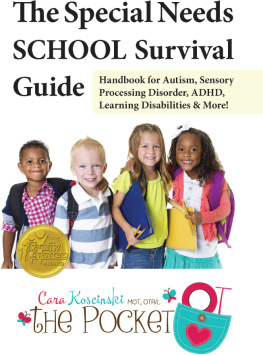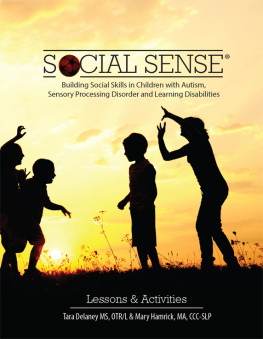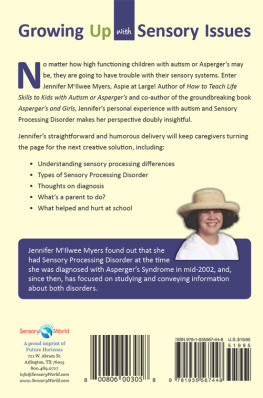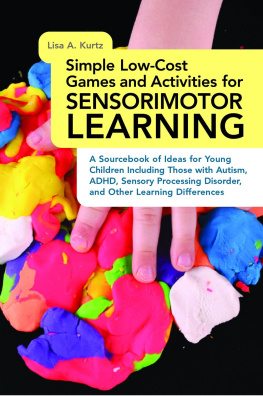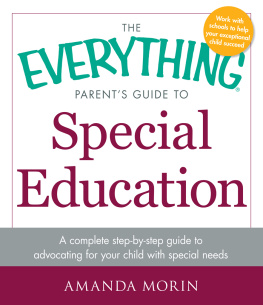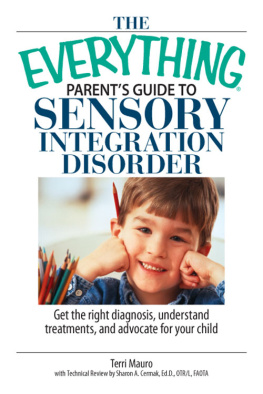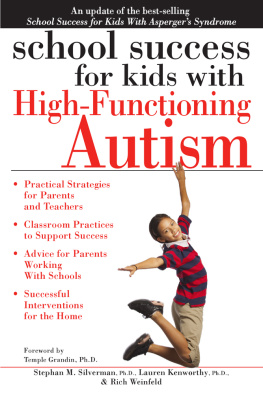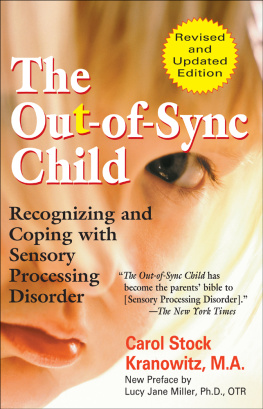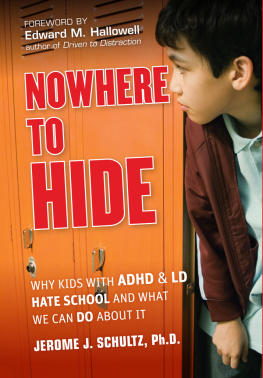The Special Needs
SCHOOL
Survival Guide
Handbook for Autism, Sensory Processing Disorder, ADHD, Learning Disabilities & More!
 | Cara Koscinski MOT, OTR/L
The Pocket Occupational Therapist |
The Special Needs SCHOOL Survival Guide:
Handbook for Autism, Sensory Processing Disorder, ADHD, Learning Disabilities & More!
All marketing and publishing rights guaranteed to and reserved by:

721 W Abram St, Arlington, TX 76013
800-489-0727 (toll free)
817-277-0727 (local)
817-277-2270 (fax)
E-mail:
www.fhautism.com
Copyright 2015 Cara N. Koscinski MOT, OTR/L
All rights reserved.
Printed in the United States of America.
No part of this product may be reproduced in any manner whatsoever without written permission of Future Horizons, Inc, except in the case of brief quotations embodied in reviews.
This book is unedited for content. Any opinions are those of the author and are not necessarily shared by the publisher.
ISBN: 9781941765210
Dedication
To J and J:
Being your mom has taught and blessed me more than I could have ever imagined.
Most importantly, I now understand that anything is possible if you work hard enough and find joy in the situation.
There will be haters, there will be doubters,
there will be non-believers
and then there will be YOU, proving them wrong.
Unknown
Contents
Acknowledgments
A very special thank you to all of those students Ive been blessed to work with. You have taught me to be creative and think outside of the box. Ive learned something from EVERY one of you! Most importantly, I think of you all as children who needed a little help to unwrap your gifts.
This book would not have been possible without the support of my family. B, thank you for honoring my requests of quiet time, and indulging my constant passion for OT and writing. J and J, homeschooling has meant more to me than youll ever know. The time spent teaching you has been a true blessing!
Angie, I thank your for your advice with publishing and your kindness. I admire you and all of your contributions to our field.
To Marie, your constant support and enthusiasm for the field of OT has been contagious! Youre ALWAYS willing to endorse my work. I am blessed to know you.
Dad and Mom, you believed in me from the day I decided to become an OT. Even though I received a FULL scholarship to a university which did not have OT as a major; you provided me with a private and expensive education to fulfill my OT dreams. Im forever grateful.
To my autism e-mail buddies, I love connecting and laughing with you! What a great group of ladies.
Last, but never least, is my sister. Kim, words escape me, and all I can say is that youre my world!
I love you.
Introduction
As I raise my own children with special needs, I am always in search of publications that will give me a feeling of empowerment. Its with that thought in mind that I write my own books. As The Pocket Occupational Therapist, its my desire to provide you with the most up-to-date and comprehensive information. Every book is meant to assist you not only to use techniques, but to understand the why behind them. Teaching the caregiver is my passion.
Parenting, teaching, and/or working with students who have special needs is a true gift. Please remember that every child develops at his own pace and one student should never be compared with another. Always consider the students developmental level; not his age level. Many students, even those without special needs, acquire skills at their own pace. We are all unique! Additionally, remember to work as a team for the benefit of the child.
Not everyone who teaches a child with special needs also lives with one (or more) of these awesome kids. Its by living with and working with students who have special needs that Ive learned so very much. Resources are listed at the end of most chapters. Ive been objective and have provided a comprehensive list of websites and references. No monetary compensation has been given to me by any of the resources in exchange for listing them in my book. I have, however, had the privilege of using some of the products for my own students throughout the years.
Please note that every disability comes with unique challenges and I cannot possibly list every one. The same is true for accommodations. No list is exhaustive and we all learn more and more from each other every day. Feel free to add your own ideas in the Notes section.
This book is not a substitute for medical advice. I urge you to consult your individual health professional or occupational therapist prior to beginning any of the activities or programs listed in this book.
I sincerely thank you for reading!
Many blessings,
Cara
Chapter 1
IEP 101What You Need to Know

About IEPs and 504 Plans; What Are IEPs?
The acronym IEP stands for Individualized Education Program. It was derived from the Individuals with Disabilities Education Act (IDEA). Once qualified under this act, the child (according to part b of the IDEA) qualifies for a Free and Appropriate Public Education (FAPE). Each student between the ages of three and twenty-two should have access to general and special education services free of charge. Additionally, the student with disabilities must have access to the same educational services as students without disabilities. This rule includes extra-curricular events. A student with special needs may also qualify for a behavioral intervention plan. The plan is administered along with the regulations of the IDEA law. Remember though, all students are responsible for following the rules of their school districts, but if the student with an IEP requires disciplinary action, the team must discuss whether or not the students disability contributed to his behavior. It is quite complex and is far from black and white, so its important to understand your students rights.
To qualify for this program through the IDEA law, the student must have one or more of the disabilities listed. There are thirteen of them. (Please refer to www.wrightslaw.com for details.) The key is that the disability must adversely affect the students performance in school/education. As a result of the disability, the child needs specialized education services to make progress in school and to benefit from the general education program. The purpose of any IEP must be to provide a program that is specifically tailored to each students needs. The IEP refers both to the meeting held to make the document and the actual document created at that meeting. The goals specified within it must be measureable with smaller and more detailed goals (called short-term goals). The IEP needs to be updated every three years, if not before. The IDEA also outlines what options a family has if they disagree with the outcomes of the IEP meeting. According to the Rehabilitation Act of 1973, there may be no discrimination of any student going to a school which is federally funded. The key is that the disability substantially limits major life activities. Another law, the Americans with Disabilities Act (ADA) applies to education because its goal is to prevent discrimination against those with disabilities. Additionally, Congress updated the IDEA in 2009 to ensure that all accommodations which were previously not documented must now be formalized. Its important to note that plans are included if students attend a school that is government funded.
Next page
